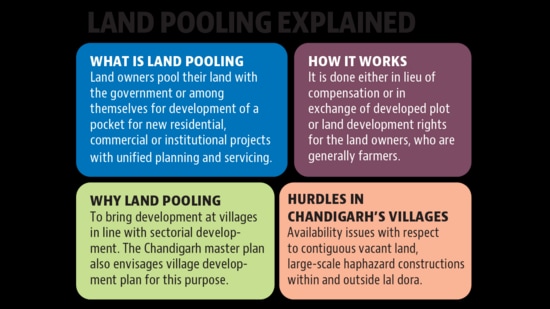2 yrs on, Chandigarh’s land pooling policy for villages hangs fire
With limited contiguous vacant land available in Chandigarh’s villages and lots of constructions already having taken place outside the lal dora, the UT administration’s attempts at bringing out a comprehensive land-pooling policy has hit a major roadblock
With limited contiguous vacant land available in Chandigarh’s villages and lots of constructions already having taken place outside the lal dora, the UT administration’s attempts at bringing out a comprehensive land-pooling policy has hit a major roadblock. UT had initiated the process of formulating the policy a couple of years ago, but it still remains on the drawing board.

The aim was to bring development in city’s villages in line with those of other sectors and proceed with the formulation and implementation of village development plan as envisaged under the Chandigarh Master Plan. Notably, in the last municipal corporation general House meeting, councillors cutting across party lines passed a resolution and asked the administration to bring land pooling policy for the erstwhile villages.
“The process of formulation of a land-pooling policy has turned out to be a very complex affair. There is hardly any vacant land in villages which can be tapped under it,” said a senior UT official. “We have also studied land pooling in other states like Punjab and Haryana. But, in these states, there are large contiguous vacant land available which can be pooled together,” the official added.

The issue of haphazard constructions in villages has also plagued the formulation of the policy. The constructions, most of which are illegal, have to be demolished for the policy to have any practical value, some experts have suggested. “But, this has to be done only through involvement of people. Lots of public consultation will be needed. It has become very complex policy,” said the official.
The administration had roped in the Indian Institute of Human Settlement (IISH), Bengaluru, to formulate a land pooling and aggregation policy. “But, the solution to the poor availability of land has not been resolved,” said the official. On the way forward, the UT is now exploring the possibility of introducing the land-pooling option in limited area as a pilot project.
As per the current administration’s thinking, the policy will be first introduced in a village, and if successful, then it will be implemented parallelly in others too.
On the area being explored for the purpose, UT adviser Dharam Pal, said, “I have asked them (departments concerned and the consultant) to recommend such an area. We will proceed after examining results in the pilot village.”





